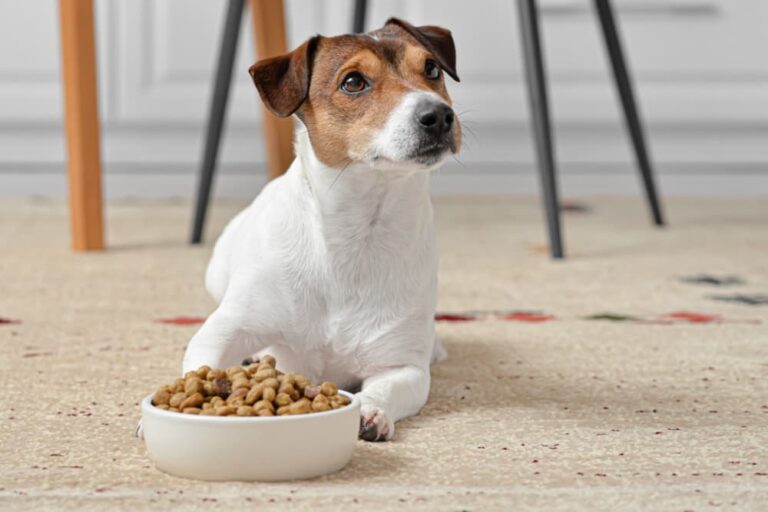Vegan Dog Food: 7 Protein Sources to Know

Vegan food has gained tremendous popularity in recent years, both for health and ethical reasons. It’s normal for pet parents to wonder if their dog can be vegan. One of the main benefits of a vegan diet for dogs is to treat certain food allergies. If your dog has allergies to one or more animal proteins, such as meat and eggs, a plant-based diet can help alleviate symptoms while still providing your pet with the protein he or she needs to remain healthy.
There are a number of plant-based protein sources that can be incorporated into your pet’s diet. However, the best kind of vegan dog food is one formulated by a veterinary nutritionist or from a reputable commercial food brand that meets the Association of American Feed Control Officials (AAFCO) regulations.
Keep reading to learn about the pros and cons of a vegan diet for dogs, and a breakdown of plant-based protein sources featured in vegan dog foods.
How Much Protein Does a Dog Need?

Similar to humans, dogs need protein in their bodies to help run everything smoothly. When consumed in the right quantities, protein helps build and repair muscles, grow and maintain tissues, and helps with essential activities throughout the body. Although the exact protein intake differs by breed and weight, it’s imperative that a balanced diet with the right protein is fed to the dog for optimal well being.
According to Dr. Michelle Burch, veterinarian at Safe Hounds Pet Insurance, the rule of thumb for meeting the protein requirement for dogs is “to feed 1 gram of protein per pound of current body weight.” To prevent protein deficiency, AAFCO recommends protein ingestion of 4.5 grams/100 kcal for adult dogs and 5.63 grams/100 kcal for pregnant or nursing dogs and puppies.
“Adequate protein ensures strength in muscles, skin, and fur while also playing an important role in managing hormones and enzymes for bodily functions to keep the immune system strong,” says Minneapolis-based animal nutritionist Ashii Vrohidis.
There are 10 specific amino acids (building blocks of proteins) that are essential for dogs. They are typically derived from top protein sources such as chicken, beef, and pork. These proteins are easily digestible and widely available. (Learn more about a dog’s protein requirements here: Protein for Dogs: Everything You Need to Know).
However, dogs can have an intolerance to certain proteins, most commonly chicken, beef, and eggs. In these instances, limited-ingredient, hypoallergenic, or vegan dog foods can be considered.
It’s important to note that not all sources of protein are created equal; ingesting too little protein can cause health issues for the pet. When a dog is not getting enough protein, it can lead to “weight loss, insatiable hunger, lethargy, and sometimes vomiting and diarrhea,” according to Dr. Lorelei Wakefield, an animal welfare veterinarian and long-time ethical vegan. “If you suspect your dog has protein deficiency (which can occur on any diet), please see your veterinarian. It can typically be diagnosed with a simple blood test.”
On the other hand, if a dog is consuming too much protein, it can cause weight gain. Dogs with kidney or liver disease should not intake excessive protein, as it can worsen the disease, Burch adds.
Can Dogs Be Vegan?

Dogs are omnivores and can eat a vegan diet so long as protein sources and other nutritional requirements are met.
“Most healthy dogs will maintain adequate blood protein on a plant-based diet. Some dogs, though, are unable to digest certain proteins well,” says Wakefield. She explains that there is confusion as to whether dogs can eat a vegan diet; they are often classified taxonomically as carnivores, “due to their dental structure and intestinal length, while they are physiologically omnivores. Their digestive systems have adapted, as they have evolved alongside humankind, eating our foods such as starches.”
Vrohidis, however, says that while plant-based protein can provide “a multitude of vitamins and minerals and help initially lower cholesterol, weight loss, and rectify liver issues, they do not contain the proper absorption for normal canine bodily functions.”
If your dog has allergies and/or food sensitivity to meat and eggs, and you are considering a vegan dog food, it can be helpful to seek advice from a board-certified veterinary nutritionist. “A boarded veterinary nutritionist will help choose the best vegan diet for your pet or create a specialized homemade recipe ensuring your pet is eating all of the vital nutrients needed for long and healthy life,” recommends Burch.
Vegan Dog Food Benefits and Risks

A major benefit of vegan dog food is the treatment of food allergies, which manifest in the form of skin and ear inflammation and infections. “Plant-based dog food tends to be low in common dietary allergens and can help clear up itchy skin and ears,” says Wakefield.
“We often see increased energy and I have also heard reports of better joint health and even decreased tear staining,” adds Wakefield. Other benefits include avoiding foods containing hormones and antibiotics that are present in some meats.
Potential risks of a vegan dog diet include “soft stool (typically temporary) and low protein, if your dog has trouble digesting plant-based food,” Wakefield says.
A vegan diet for dogs may also be associated with canine heart disease known as non-hereditary dilated cardiomyopathy (DCM), although there is insufficient conclusive data at this time. “The most recent information released by the FDA based on their investigation shows a high correlation of (non-hereditary) DCM with diets with a high concentration of peas or lentils,” says Burch (1).
Burch also warns that vegan diets can be “deficient in amino acids, including leucine, methionine, methionine-cystine, and taurine, which are all needed to maintain health.” She recommends working with a veterinary nutritionist who can “formulate a complete and balanced diet to prevent any adverse effects from a deficient diet.”
Vegan Dog Food: 7 Protein Sources to Know
Most plant-based proteins are not complete amino acids. Instead, they contain limiting amino acids, such as lysine, threonine, methionine, and tryptophan. According to Vrohidis, these protein sources are meant “to be consumed with a different plant-based protein that is rich in a complementary amino acid for absorption.” Foods with limiting amino acids include beans, grains, corn, peas, potatoes, and legumes.
Below are seven common plant-based protein sources that are included in vegan dog foods:
Soy
Soy is a protein sourced from soybeans that is commonly found in dog foods. As long as your dog does not have a diagnosed soy allergy, this protein-rich meat substitute can be a good option, because it is also high in dietary fiber, vitamins, and minerals. Half a cup of cooked textured soy protein has 11 grams of protein.
Quinoa

Quinoa is a nutrient-rich seed, despite often being referred to as a grain. Vrohidis says quinoa is “your safest plant-based complete protein, which has less protein by volume compared to its animal counterparts.” One cup of cooked quinoa provides 8.14 grams of protein.
Buckwheat
Despite its name, buckwheat is not wheat; it’s actually a gluten-free seed packed with iron, copper, potassium, and magnesium. While not as high in protein as quinoa, buckwheat is another plant-based source of complete protein. A cooked cup provides 3.38 grams of protein.
Chickpeas

These legumes, also known as Garbanzo beans, are easily digestible, rich in carbohydrates and protein, and full of fiber. A cup of cooked chickpeas has a whopping 20 grams of protein.
Barley
While it doesn’t have as much protein as quinoa, barley is still a good source of protein (with 3.55 grams of protein per cup). It’s a cereal grain that is low in cholesterol and high in fiber.
Oats

Oats, which are grains from the cereal plant, Avena Sativa, are a good source of fiber and protein. They make a good alternative to wheat. One cup of whole grain rolled oats has 10 grams of protein.
Green Peas
Peas are an excellent source of protein, fiber, vitamins, and minerals. One cup of peas provides close to 8 grams of protein. While experts say there is no reason to completely avoid dog foods that contain high quantities of peas at this time, it’s worth using caution until researchers determine the exact cause of DCM.
Homemade Vegan Dog Food
Vegan diets are often challenging to design and formulate; they may not meet all of the dog’s dietary needs if done without consultation from a veterinarian nutritionist.
Alternatively, a quality commercial vegan dog food that meets the AAFCO requirements to ensure that the appropriate amount of protein is ingested, can be given to the dog. However, a study of 24 commercial vegan or vegetarian diets in 2015 concluded most diets were not compliant with AAFCO labeling regulations (3). “Many had concerns regarding adequate amino acid content,” says Burch. It’s important to read product labels and/or contact the company before switching your dog’s diet.
Vegan Diet for Dogs: Other Considerations

You may be considering vegan dog food for ethical reasons. However, Burch reminds pet parents that “if the diet is not tailored specifically for your dog with a veterinary nutritionist, this can create significant health problems.”
The FDA suggests reviewing the ingredient list on your pet’s food to see whether legumes like peas or lentils, other legume seeds (pulses), and/or potatoes are listed as one of the main ingredients, and to work with your veterinarian prior to making any changes in your dog’s diet (1).
If your dog has food allergies and cannot consume certain animal proteins, work with your veterinarian to choose the best diet for your pet that will ensure he gets all the nutrients, minerals, and vitamins he needs to be healthy.









